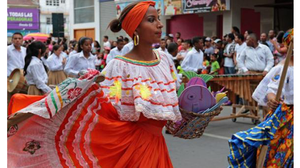CONVENTION FOR THE SAFEGUARDING OF THE INTANGIBLE CULTURAL HERITAGE INTERGOVERNMENTAL COMMITTEE FOR THE SAFEGUARDING OF THE INTANGIBLE CULTURAL HERITAGE Nineteenth session Asunción, Republic of Paraguay 2 to 7 December 2024 Item 13 of the provisional agenda: Report of the non-governmental organizations forum Summary The present document brings the attention of the Committee to the report by the ICH NGO Forum on its activities since the eighteenth session of the Committee in December 2023. Decision required: paragraph 6 LHE/24/19.COM/13 – page 2 1. Since 2020, the Committee has examined an annual ‘Report of the Non-Governmental Organizations Forum’ as a stand-alone agenda item, following the request by the Committee at its fourteenth session in 2019 (Decision 14.COM 15). Pursuant to Decision 18.COM 15 adopted by the eighteenth session of the Committee, the present session of the Committee is requested, once again and for the fifth time, to examine such a report submitted by the ICH NGO Forum as provided in the annex. 2. The report highlights a wide range of activities implemented between December 2023 and September 2024. They address the geographical imbalance among accredited nongovernmental organizations through awareness raising, strengthening capacities of accredited non-governmental organizations in specific areas (such as the implementation of the Overall Results Framework), the expansion of the communication efforts, and strengthening of cooperation with other UNESCO programmes. The report also shows the increasing number of webinars, workshops and interventions organized by the working groups established under the ICH NGO Forum umbrella. These working groups explore different thematic issues related to living heritage safeguarding, such as climate change, sustainable development, sustainable tourism, archiving, emergencies, displaced persons, and intellectual property. 3. The report also notes that the Secretariat is about to launch the second phase of the project on mapping the domains of competence of accredited non-governmental organizations in close cooperation with the ICH NGO Forum. This initiative is the continuation of the first phase of this project (2021–2023), the results of which can be consulted on the webpage of the Convention. Once the second phase is completed, the profiles of 165 out of the 264 currently accredited non-governmental organizations will be presented online. The Committee may wish to encourage the Secretariat to continue its collaboration with the ICH NGO Forum on this project to ensure that the mapping exercise covers the remaining accredited non-governmental organizations. 4. The Secretariat supported the work of the ICH NGO Forum during the reporting period, facilitating several meetings with UNESCO to enhance information exchange and coordination. Building on the active participation of accredited NGOs in the recent global reflection on the listing mechanisms of the Convention and the reflection on a broader implementation of Article 18 of the Convention (entailing a three-part meeting of an open-ended intergovernmental working group, two expert meetings, and two global surveys), collaboration with accredited non-governmental organizations continued during the implementation of the thematic initiatives of the Convention. The collaboration involved two global surveys disseminated to all accredited non-governmental organizations and two expert meetings attended by representatives from accredited non-governmental organizations. Additionally, assistance was provided for the participation of ICH NGO Forum representatives in two meetings organized by UNESCO: the 16th International Forum of NGOs in Official Partnership with UNESCO on ‘Sustainable Cultures’, held in Abidjan, Côte d’Ivoire (15 to 16 April 2024) and the fourth Memory of the World ‘Global Policy Forum’, held at UNESCO Headquarters (29 October 2024). 5. Further support is provided to the ICH NGO Forum in the context of the nineteenth session of the Committee, such as through financial assistance to cover the travel costs of accredited non-governmental organizations based in developing countries, including all members of the ICH NGO Forum’s Executive Board. Furthermore, as has been the practice for several years, a meeting room will be dedicated to the ICH NGO Forum’s activities throughout the week at the venue of the Committee session. One of the activities will be the ICH NGO Forum’s annual symposium, to be held on 1 December 2024, for which the Secretariat will provide support to ensure interpretation in English and French. 6. The Committee may wish to adopt the following decision: DRAFT DECISION 19.COM 13 The Committee, 1. Having examined document LHE/24/19.COM/13 and its annex, LHE/24/19.COM/13 – page 3 2. Recalling Decisions 14.COM 15 and 18.COM 15, 3. Takes note of the activities undertaken by the ICH NGO Forum since the last session of the Committee, notably those that have the potential to strengthen the advisory role of accredited non-governmental organizations to the Committee; 4. Commends the ICH NGO Forum for the activities aimed at increasing the number of nongovernmental organizations based in underrepresented regions, and encourages the Forum to pursue its efforts in this regard, in close cooperation with States Parties, category 2 centres and UNESCO Chairs, and in close coordination with the Secretariat; 5. Appreciates the readiness demonstrated by the ICH NGO Forum to actively pursue the development of the Convention and support its governing bodies, notably as regards the thematic initiatives of the Convention, synergies between the protection and safeguarding of tangible and intangible cultural heritage, intangible heritage and climate change, sustainable tourism, archiving, and the reflection on a broader implementation of Article 18; 6. Welcomes the continuation of the mapping of the competencies of accredited nongovernmental organizations and their visualization through the webpage of the Convention, and requests the Secretariat to continue its collaboration with the ICH NGO Forum to ensure that the mapping exercise covers the remaining accredited nongovernmental organizations; 7. Decides to include a separate item on the ‘Report of the non-governmental organizations forum’ on the provisional agenda of its twentieth session. [Report submitted by the ICH NGO Forum in English and French] ANNEX ICH NGO Forum Initiatives, Activities, and Action Plans – A Report to the Nineteenth Session of the Intergovernmental Committee for the Safeguarding of the Intangible Cultural Heritage The ICH NGO Forum is the primary voice of civil society for the 2003 ICH Convention, mandated in Article 9 to provide the Committee with advisory services. It engages in multiple activities that address key issues, policies and good practices relating to the Convention. They encompass a broad spectrum of topics: sustainable ICH tourism, safeguarding of intangible heritage for climate action, intellectual property, the Overall Results Framework, collaborative safeguarding among multiple types of stakeholders, advocacy for culture as a sustainable development goal, ICH in emergency situations and among displaced persons, archiving and participatory methodologies. Recognizing the imperative to correct imbalances in the geographical representation of accredited NGOs, it is organizing activities in every underrepresented region to generate applications for ICH NGO accreditation. It continues to develop collaborative relationships within and beyond UNESCO while building its own organizational development as an NGO. The Forum represents 264 NGOs from every UNESCO region. Its diverse membership includes community based organizations as well as regional, national and international NGOs. They possess wide ranging expertise, including innovative safeguarding practices undertaken in collaboration with multiple types of stakeholders and policy development attuned to the mission of the Convention. Through its extensive activities alongside the Committee meetings, working groups active throughout the year and recently expanded, robust communication platforms it serves as a meeting ground for accredited NGOs (ANGOs) to share their expertise, build stronger regional networks and advance the implementation of the Convention. This report describes ongoing activities along with new initiatives carried out and planned during the past year. Redressing Geographical Imbalances and Advancing Inclusive Engagement The Forum is mobilizing to redress geographical imbalances among accredited NGOs through organizing online workshops to introduce the Convention to non-accredited NGOs, describe the benefits of accreditation and provide instructions on how to apply for accreditation. These activities, to be led by the 2024 Forum’s Executive Board and assisted by its More Balanced Geographical Representation Working Group, will include workshops in both French and English for Africa, in Arabic for the Arab States as well as for the Eastern Europe, Asia and Latin America/Caribbean regions. The format for these workshops will draw from the online accreditation workshops for Latin America and Eastern Europe held in the winter of 2023, adapted for each region by facilitators from the targeted region. Like the workshops held in 2023, the winter 2025 workshops will involve collaboration with regional stakeholders and are expected to again receive Category II Center financial and operational support. The 2023 workshop for Region III, Latin America/Caribbean, was especially fruitful. It resulted in a doubling of accredited NGOs, from 11 to 23. We fully expect that the online workshops in other regions in the early winter of 2025 will be likewise successful. Already over 15 non-accredited NGOs in Africa indicated that they will attend the workshops for Africa. The Living Heritage Unit will contact UNESCO offices in Africa and the Arab States, regions to be prioritized this year, to encourage them to promote these workshops and potentially provide assistance to the Forum. We would be especially grateful for State Parties to promote and attend workshops in their regions. The Forum is creating a data base of non-accredited NGOs for each underrepresented region, with ongoing additions requested from the Forum’s membership, which will complement contact information provided by State Parties and NATCOMS. This data base provides contact information for NGOs to be invited to workshops. Applications will be encouraged from NGOs in underrepresented regions substantially engaged but not primarily specialized in ICH, such as libraries, museums, archives and cultural organizations. The Forum’s membership is exercising greater selectivity in encouraging accreditation applications from Region I, which is heavily overrepresented relative to other regions. Inclusive participation by NGOs from every UNESCO region in all of the activities of the Forum is an ongoing priority. Members from every underrepresented region are represented in the Forum’s leadership and its other activities. Electoral Board members are selected in order to represent every region that is not represented in the current year’s electoral slate (election slates alternate between regions every other year). ANGOs from all regions are encouraged to join working groups. Applications to establish new working groups must have at least three founding members from different regions. Every year online orientation sessions in French and English are presented for new ANGOs to learn about the Convention, the agenda, rules and procedures of the meetings, and how they can participate most effectively at their first Intergovernmental Committee meeting and in ongoing Forum activities. These workshops explain the Convention, the agenda and ways for new ANGOs from every region to participate effectively at their first meeting. The Executive Board is currently made up of one elected member from each of the six electoral regions and one international NGO representative. The international seat, historically occupied by organizations from Region I, will be discontinued following the end of the term of its current representative in December 2024. Working Groups (WG’s) are the lifeblood of the Forum and the primary means for inclusive, active participation. During the past two years the number of WGs have increased and an ever expanding number of Forum members from every region participate in their work. They address key ICH issues and practices, anticipate concerns not yet dealt with by the Convention and deal with emerging and ongoing matters of interest and concern. Several of the Working Groups hold webinars on topics relating to their area of interest which are open to anyone interested in ICH. The current WGs include the following: ● Conflict and Displacement ● Gender and Intellectual Property ● ICH, Climate Change and the Environment ● Legal and Policy Development ● More Balanced Geographical Representation of NGOs ● Overall Results Framework ● Research All WG’s are required to have requirements for electing officers, a mission statement, an acceptable governance structure, an annual report of activities and an agenda for the work to be undertaken during the coming year. They are eligible to receive financial support of $100 for translation and up to $300 for specific projects. Practices, Policies and Key Issues Addressed by the Forum The Forum is increasingly focusing its attention on specific dimensions of ICH. These practices, policies and issues include topics that have yet to be dealt with in the Convention and emerging matters of concern as well as core, ongoing aspects of ICH. ICH and Climate Change Climate change threatens ICH to a rapidly growing extent. Traditional agricultural, maritime and forestry practices are diminished and forced to adapt. Plants used for crafts and performances are no longer available as biodiversity is lost. Increasingly severe natural disasters displace communities of practice. While communities have at times been able to utilize their customary knowledge to foster resilience, the climate change crisis wreaks unavoidable adverse impacts requiring ICH policy responses informed by Indigenous knowledge systems along with scientific expertise, mitigation strategies and climate actions to safeguard the material and immaterial values of vulnerable populations. In June the Forum adopted the Declaration for the Safeguarding of Intangible Cultural Heritage for Climate Action, which provided a call to action and recommendations to address climate change crisis impacts on ICH. Its policy recommendations include interdisciplinary and intersectoral research for safeguarding ICH in the context of climate change, the integration of the traditional knowledge of communities with scientific expertise, enhancing ICH as a tool for strengthening resilience, mitigation and as a leverage for biodiversity; consideration of spiritual relationships to nature and inclusion of climate change in the listing of ICH elements and periodic reporting. The Declaration was adopted over the course of many months of highly deliberative policy discussions among the entire membership of the Forum that was finalized in an Extraordinary General Assembly. It was launched in a side event with compelling case studies at the 10th General Assembly of the Convention to a capacity audience of states parties and NGOs. And it was cited in the Guidance Note at the Expert Meeting on Living Heritage and Climate change convened by the Living Heritage Entity on 19 - 20 June. The Working Group on ICH, Climate Change and the Environment presents online seminars throughout the year featuring case studies that deal with both threats and resilience strategies. This year the topics include adaptation of traditional building techniques for post-earthquake recovery, the impact of thawing of the Arctic permafrost on the hunting and gathering practices of Inuit populations along with their mitigation responses and local ICH practices in water mills management, grassland irrigation, bird catching and nest protection, hedge braiding and beekeeping utilized to understand and combat flooding, erosion, and biodiversity loss. Sustainable ICH Tourism A sudden increase in tourism is often the inevitable consequence of inscription on an ICH list. Although ICH tourism has massive impacts that should not be ignored, it has been largely overlooked within the Convention. ICH tourism provides economic benefits to bearers and their communities, shining a bright light on traditions whose practice had diminished and, more often than adequately recognized, contributing to renewed practice and revitalization. However, recontextualization of customary cultural practices occurring when traditions are adapted to new audiences which result in changes in form, content and cultural meaning are often adverse. All stakeholders to the Convention should endeavor to ensure that ICH tourism activities are well grounded in traditional practices, maintain cultural integrity and embody community cultural self-determination. The Forum’s Research Working Group has undertaken a number of initiatives to examine the impact of tourism on ICH and provide guideposts for sustainable ICH tourism. These initiatives are clear eyed in recognizing both the benefits and damaging effects of ICH tourism. The Web Dossier on Intangible Cultural Heritage and Sustainable Tourism, which was first published online in 2022, continues to receive widespread attention among tourism and heritage stakeholders, ICH practitioners and scholars. It was translated to French and is to be translated to Spanish and Korean. It was the subject of a colloquium and is included in a curriculum at the Sorbonne, is becoming integrated in higher education and is contributing to policy and practice development around the world. The Web Dossier is a living document that will continue to be expanded with new case studies and accounts of tourism experiences that illustrate local ICH tourism initiatives in both rural and urban contexts, and point out their successful as well as challenging dimensions. It proposes concrete tools to plan actions and build partnerships between practitioners and tourism stakeholders. It is global in scope, with examples that include tourism associated with the Ninki Nanka Trail through rural villages in Gambia, Cambodia’s Apsara dance, horseback shrimp fishing in Oostduinkerke, Belgium; the Florida Stories: Walk Tarpon Springs app based tour through sites associated with Greek American traditions and Andean Lodges in Peru, which conjoins ecotourism and presentation of ICH by local communities. The Research Working Group also produces ICH Tourism Dialogues, an annual series of online webinars and conversations on Living Heritage and Tourism. These dialogues include speakers on ICH Tourism from NGOs, the travel industry, government and intergovernmental agencies. The Forum engaged in a number of other tourism related activities in 2024. The Forum’s President met in June with the Senior Program Specialist responsible for sustainable tourism of the World Heritage Centre to discuss ICH tourism and consider possibilities for future collaborations. Representatives of the Research Working Group presented at the Jeonju International Forum for Intangible Cultural Heritage and Tourism. And from 2024 to 2027, this Working Group is also supporting and advising the Creative Europe collaborative project ‘Living Heritage Journeys’. It is exploring innovative methods to incorporate ICH into tourism in sustainable ways through 5 pilot projects with UNESCO Listed Heritage sites and accredited NGOs to develop new capacity building instruments for meaningful and sustainable ICH Tourism Participatory Approaches to Safeguarding Living Heritage Community based, participatory approaches for ICH safeguarding is a foundational principal of the 2003 Convention. Since it was first ratified there have been ongoing efforts to identify and implement methods that ensure community agency in inventorying, nominations, heritage governance and ongoing safeguarding. The 2024 Symposium of the Forum immediately preceding 19.COM in Paraguay on 1 December will explore participation by heritage communities, NGOs and individuals. The topics to be examined include community initiated and driven documentation and research; community based tools to transmit cultural knowledge and practices, approaches to heritage governance that facilitate bottom-up decision making and the sharing of authority entailing the mutual engagement of local stakeholders with outside experts and government heritage officials. The symposium will substantially contribute to the development of a new thematic area by the Research Working Group on ‘Participatory and Community-Based Ways for Safeguarding Living Heritage’. This thematic area aims to feed into the joint efforts of the UNESCO 2003 Convention and Mondiacult towards inclusive heritage governance in implementing the convention. And it is intended to strengthen the work of all stakeholders in working collectively to put the Overall Results Framework into effect. Proposals and presentations for the Symposium will be included in an online publication. Developing Competencies and Partnerships in Using the Overall Results Framework and Periodic Reporting The Overall Results Framework (ORF) is of key importance for the self-assessment of States Parties of how they are implementing the 2003 Convention and provides a basis for their periodic reporting. Many NGOs face challenges in using the ORF, which is seen as dry and highly complex. There is not yet adequate recognition of the great potential value of NGO employment of the ORF for attaining holistic understanding of the state of ICH and progress in safeguarding. And there is underutilization of the important and essential contribution that NGOs can make to States Parties’ periodic reporting. The Legal and Policy Development Working Group is developing a short briefing document on the role of NGOs in periodic reporting aimed at informing States Parties about how they can collaborate with NGOs in preparing their periodic reports and demonstrating ways in which NGOs are essential partners in periodic reporting. Through its Overall Results Framework Working Group, the Forum is developing an easy-to-read handbook that will explain how to use the ORF, with illustrative case studies pertaining to some of the 26 core indicators. The briefing report will underscore the added value NGOs can offer States Parties in utilizing the ORF. The handbook will enable NGOs to see how they are addressing emerging needs in achieving their goals for sustainable development and other objectives. In their online meetings and through the development of these materials, these working groups are exploring how applying the ORF could give greater impact to how the work of NGOs addresses issues such as inclusive social and economic inclusion, the impacts of climate change on ICH and gender equality. The Briefing Report will be available online at ichngoforum.org and ichngo.net by late November 2024. The handbook will be presented in a session on 1 December in Asuncion following the Forum’s symposium on participatory approaches to safeguarding. Safeguarding Inventorying Materials for Present and Future Generations through Archiving The 2003 ICH Convention is generating through inventorying a massive amount of documentation of cultural traditions on a global basis, quite possibly as much as ever before in human history. These materials are an enduring record of ICH for use by contemporary bearers and their communities as well as an invaluable resource for future generations for maintaining and revitalizing their intangible heritage. The current operational guidelines contain only minimal reference to archives, which are essential for maintaining these materials in a secure, accessible and organized manner. Archives of folklore and ethnomusicology established over the past century contain millions of ICH recordings and texts that are a highly useful resource but overlooked by most current ICH stakeholders. There is a lack of direction provided to ICH stakeholders about the necessity of preserving inventoried materials and an absence of advice about how they can be properly maintained in archives and other repositories. Whether or not they are appropriately kept within a repository, digital records do not live forever and require migration to new digital forms from time to time. And they require intellectual property protection and proper regard for privacy needs, particularly for records of sacred traditions. The Forum has initiated programming to inform ICH stakeholders about archival needs, resources and practices. These include a presentation at 17COM, recommendations about archiving in the report of the first phase of the mapping project to identify competencies of ANGOs and a side event at 19COM, What Can be Done with All Those Inventoried Materials – Archiving for ICH Safeguarding. whose co-sponsors include the International Society for Ethnology and Folklore, International Council for Traditions of Music and Dance, Permanent Delegation of Romania to UNESCO, Permanent Delegation of the Kingdom of the Netherlands to UNESCO and Estonia UNESCO Chair Kristin Kuutma. A meeting was held with the head of UNESCO’s Memory of the World unit about potential collaborations and the Forum’s President presented at their Global Forum in October about archival practices, with a particular focus on documentation of ICH in emergency situations. These presentations highlight new directions in archives, which include streaming of audio and video, contemporary documentation of living heritage undertaken by archives, community driven archival activities that include metadata embodying a community’s cultural categories and interactive archival web sites that enable users to correct transcriptions and add new material. It will also emphasize the importance of an integral relationship among inventorying, informed consent essential for intellectual property protection substantiated through consent forms and depositing collected materials in archives. Activities relating to archives carried out by the Forum will hopefully point the way to substantial inclusion of the need for archiving in the Convention’s operational directives and guidance notes. Intellectual Property Since the early days of the 2003 ICH Convention, how intellectual property (IP) rights should be used for safeguarding ICH has been a matter of debate and seen primarily as the domain of the World Intellectual Property Organization (WIPO). Unfortunately, this means that most stakeholders to the Convention are not fully aware of the intellectual property dimensions of ICH. As a result, many ICH stakeholders remain uninformed, vulnerable and unprotected with regard to their economic and moral rights over their cultural practices and productions. The Legal and Policy Development Working Group is addressing this void as part of a planned series of webinars on recent developments in international law and policy. It held a webinar in the autumn of 2024 to introduce the new WIPO Treaty on Intellectual Property, Genetic Resources and Associated Traditional Knowledge, to which a representative of WIPO was invited. This webinar dealt with key issues relating to the treaty and how it relates to safeguarding ICH as well as the national and regional legal mechanisms that can be used to protect cultural traditions. It also provided an opportunity to learn more about WIPO’s related work involving policy development, informed consent, legislative assistance and capacity building. Through reaching out to WIPO, the Forum is opening pathways for developing greater understanding of the rights of ICH bearers and the protection of these rights, while establishing an association with an organization which should be a key partner of the Forum and other stakeholders to the Convention. Culture as a Sustainable Development Goal A global campaign to make culture a new Sustainable Development Goal (SDG) is now underway. The ICH NGO Forum is participating in this campaign, which is led by #Culture 2030Goal, on national, regional and international levels. It is fully in accord with #Culture2030’s advocacy efforts to the UN to recognize culture as the fourth pillar of sustainable development, integrate culture into the global development agenda and adopt a global agenda for culture. Five of the Forum’s members presented at a meeting in Abidjan, Côte d’Ivoire of NGOs in Official Partnership with UNESCO about how ICH provides justifications for this goal. The Forum issued a statement of support outlining the relationship of ICH to sustainable development. The Forum’s Statement of Support for the #Culture2030Goal outlines the multiplicity of ways that ICH is an integral part of sustainable development. These include informal education to transmit culture within and across generations, learning about local culture through formal education, resilience and adaptation in the face of climate change and biodiversity loss, sustainable traditional food production and agricultural practices that support food sovereignty and security, addressing gender equity by countering gender discrimination through selectively adapting and repurposing traditional cultural practices, sustainable tourism and cultural recovery in emergency situations. ICH is pervasive in society and culture, which the Forum believes provides substantial justifications for culture as a SDG goal that both relates to existing SDG goals and constitutes a new goal that points to its overarching importance for sustainable development as a whole. Building Bridges Between Intangible and Tangible Heritage The 2003 Convention for the Safeguarding of Intangible Cultural Heritage was born out of a movement which recognized that the World Heritage Convention did not allow for the recognition and safeguarding of a major dimension of human cultural patrimony. While the huge success of the ICH Convention in a short period of time reflects the need for it as a distinct domain of UNESCO heritage protection and safeguarding, nevertheless there is much about monuments and material culture that involves ICH. Material culture and monuments change over time due to human agency, ICH shapes the construction and restoration of monuments and traditional know how and tricks of the trade shape how an object, building or monument are created. ICOMOS is an accredited ICH NGO which has an International Scientific Committee for Intangible Cultural Heritage (ICICH) that recently completed an ICH Charter. In an interview for the first phase of the Mapping Project with Munish Pandit, the President of ICICH until recently, he indicated that ICH encompasses beliefs, traditional building crafts skills and ideas about the craft that craftsperson possesses, the layout of buildings, selection of materials, processes of making materials, the selection of a site, rituals and song. He noted that ecological factors are associated with this ICH and the tangible heritage of a monument or site and that rituals may be performed before, during and after the completion of a work. Pandit and his successor as ICICH President, Angel Cabeza, expressed eagerness about engaging in collaborations with the ICH NGO Forum. Engagement of the Forum with ICICH President is about to begin. Members of the Forum who are also active in ICOMOS commented on the draft ICOMOS ICH Charter in their capacity as ICOMOS members. The final version of the draft Charter embodies their revisions, which encompasses key concerns of ICH that include community participation, inventorying, authenticity, community custodianship, informed consent, ethics and safeguarding. The Charter, when approved, is expected to state that its purpose is to recognize ICH as integral to site based heritage and encourage integrated tangibleintangible heritage practice aligned with the 2003 Convention. ICOMOS is a much larger and longer established NGO than the Forum, and the World Heritage Centre is a long established unit of UNESCO. The strong interest and commitment of the ICOMOS to ICH should not be viewed as competitive with the ICH Convention, which while newer and smaller has a highly robust, enthusiastic and supportive constituency. The forging of new relationships with ICOMOS and the World Heritage Centre (WHC) is timely and important. In 2023 WHC funded the Forum to research and write an online publication on ICH, crafts and sustainable tourism in and around World Heritage Sites, Safeguarding Living Heritage at World Heritage Sites: Case Studies on Crafts and Sustainable Tourism. It includes 10 case studies and recommendations for collaborations involving entities involved in ICH and tangible heritage. As previously mentioned, the Forum’s President discussed possibilities of future collaborations with the Senior Program Specialist responsible for sustainable tourism of WHC, who indicated that they could occur if funding becomes available. Collaborations with ICOMOS would need to be complementary, mutually supportive and maintain the distinctiveness and autonomy of each organization. ICH in Emergency Situations and Among Displaced Persons The upsurge in recent years of armed conflicts, migrations from the Global South, natural disasters and climate change along with the COVID 19 pandemic dramatize the importance of ICH emerging out of these situations and the need to safeguard the intangible heritage of displaced persons. Forum members are engaged in documenting the traditions of communities displaced by war in Ukraine, Syria, Palestine, as well as in other conflicts. Throughout the world, communities, groups and individuals were highly resourceful in sharing ICH on virtual platforms during the COVID 19 pandemic and transmitting traditions over the internet when possible. The Forum’s Working Group on Conflict and Displacement is gathering accounts of good practices, photographs and videos relating to the safeguarding of ICH among those impacted by conflict and displacement. It also plans to develop relationships with UN entities that provide humanitarian aid in order to incorporate ICH dimensions in their work. This Working Group is producing events which include an on-line side event at 19COM presenting best practices and experiences in working with ICH communities experiencing conflict and displacement. A program is planned in recognition of World Refugees Day in June 2025 to bring greater visibility to the international scope of this issue. The event will include refugees and discussion of their ICH. Mapping Project Phase II – Identifying NGO Expertise, Advancing Professional Development and Broadening Implementation of Article 18 The first phase of the mapping project to identify competencies of ANGOs in 2021-2022 yielded rich and unexpected outcomes. While it was supported by the Living Heritage Unit primarily to identify the competencies of accredited NGOs, the survey and interviews revealed areas of expertise previously unrecognized, pointed the way to new methods for sharing expertise among NGOs and revealed a wide variety of good safeguarding practices that should be utilized for the broader implementation of Article 18. And it resulted in the creation of infographics of over 60 NGOs that now grace the UNESCO ICH website with texts outlining the work of each NGO and illustrating their activities in an attractively designed format. The Forum is delighted that the Living Heritage Unit is funding a second phase of the mapping project, which will greatly expand the number of NGOs covered. Building on the first phase of the mapping project, an expanded number of types of safeguarding practices will be identified in the second phase. As was the case during the first phase, the Forum will seize the opportunity of interviews to also learn other information about how NGOs are responding to the requirements and opportunities of the Convention, their experiences with the Forum and recommendations for improvements in how the Convention is operating. Phase Two of the mapping project will continue to examine how NGOs are carrying out good safeguarding practices identified in the first phase. Now that these practices have been identified, the second phase will go into greater depth in interviews with ANGOS about these topics: ● Formal and non-formal educational programs that involve transmission of ICH across generations and incorporate ICH in primary, secondary and tertiary educational curricula ● Organizational development, financial management training, governance structures and the use of sustainable business models that enable safeguarding to occur in stable and financially secure organizations ● Production practices for videos, podcasts, radio and television programs which amplify ICH to wide audiences and stimulate safeguarding ● Inventorying and documentation carried out with community members trained in the use of documentation equipment using digital technologies ● Utilization of archives, training in archival methods, innovative archive web sites and repatriation of ICH collected from outside of source communities initiatives that stimulate renewed practice of traditions. ● Multiple modes of presenting and interpreting ICH including museum public programs, festivals, lecture/demonstrations and concerts that spread awareness of ICH to new audiences and provide expanded opportunities for practice ● Sustainable ICH tourism initiatives that provide economic benefits to bearers and their communities, involve local self-determination about how traditions are represented, maintain cultural integrity and, when warranted, restrict or proscribe access by outsiders ● Crafts training and marketing ● Utilizing ICH for socially ameliorative purposes and in integration with such other objectives as mediation of conflict and addressing domestic violence ● ICH generated during and following emergency situations including natural disasters, periods of armed conflict, pandemics and forced migration ● Safeguarding for cultural practices less frequently recognized as ICH, which in the first phase included midwifery, blacksmithing and other metallurgy practices, martial dance, traditional graphic arts, ethnoarchaeology, oral history, place names, pilgrimages, weather lore and animal husbandry ● Programs connecting environmental sustainability and ICH ● Programs linking ICH and tangible heritage, including ICH employed in monuments and historic preservation programs During the three years since the first phase the Forum has identified the following additional areas of expertise and practice which will be included in the second phase of the survey and in interviews with NGOs that have identified them in their survey responses: ● The impact of climate change on ICH along with mitigation and resilience strategies ● Utilization of the Overall Results Framework and engagement with states parties in periodic reporting ● Intellectual property protection ● Distinctive features of ICH in urban contexts ● Gender issues relating to ICH ● Participatory approaches for safeguarding ICH, including the dynamics of relationships that restrain or enable community participation Regional networks among ANGOs are expanding and solidifying. These networks are ideal platforms for advancing the sharing of expertise about safeguarding and management among NGOs. Phase II of the Mapping Project will consider how to put into action a framework for technical assistance and professional development for areas of technical assistance and professional development identified as priorities by survey respondents. This framework would be utilized, adapted or reframed in each region. It could involve both short- and long-term technical assistance and professional development programs involving peer-to peer mentoring both virtually and in person, within and among regions. Good safeguarding and management practices could be showcased at side events occurring alongside the Intergovernmental Committee meetings and produced within regions. Towards Improved Integration of NGOs Within the Convention Clearly, the Forum is focusing on many issues, policies and practices of central importance to the Convention. It is well equipped to engage with these topics due to the extensive on the ground experiences of its members and professional expertise that encompasses every aspect of ICH. While in the last two years more opportunities were provided to intervene during Committee meetings, there remain critically important arenas where the Forum has not yet been able to adequately contribute its perspectives and expertise. The identification of good safeguarding practices carried out through the mapping project should contribute substantially to the Broader Implementation of Article 18. The outcomes of this research embody a remarkably large amount of research and analysis that can obviate the need to duplicate efforts in furthering this initiative. The Forum feels that is should be consulted and contribute to this initiative at every stage of its development. Likewise, current themes of the Secretariat involve topics that have been dealt with in the past, with results that should contribute to the research and analysis undertaken for these theme areas. The Forum’s 2022 ICH and Climate Change symposium and current dialogue series include a number of case studies that were overlooked in the climate change theme area development. The Forum’s 2019 symposium on ICH in urban contexts included case studies which would be of value to the ICH in cities theme to be undertaken in the coming year. And the Forum’s project on crafts entrepreneurship and sustainable tourism undertaken for the World Heritage Centre could have contributed to the theme area on economic dimensions of ICH safeguarding. The Forum has not been involved in the planning and implementation of theme areas and, in one case, was not even invited to an expert meeting. The Forum requests that the upcoming theme areas of ICH in cities and any future activities on tourism applies work carried out by the Forum and includes its representatives throughout planning and development. The ICH in urban contexts symposium is but one example of ICH policies, practices and issues engaged by the Forum which the Convention as a whole has not yet addressed or has recently begun to deal with. As mentioned previously, archiving and intellectual property are matters of critical importance for the protection and perpetuation of ICH that are yet to be dealt with by the broader Convention. Climate change impacts, mitigation and resilience had become a major concern of the Forum by the time the theme area began. Other matters of policy and practice discussed here are ongoing concerns of the Convention, including participatory approaches to safeguarding heritage, the Overall Results Framework and Periodic Reporting, ICH in emergency situations and among displaced persons and sustainable development. The Forum can make substantial contributions to these areas. ANGOs are actively interested in the forthcoming MONDIACULT convening. The Forum heavily promoted the recent MONDIACULT survey to its members, and many responded. A webinar on the MONDIACULT process will be presented by the Legal and Policy Development Working Group in 2025. Collaborations with other UNESCO entities and ICOMOS that are under discussion or being developed are of present and potential value to the Convention. While it is important that ICH remain an autonomous area of heritage within UNESCO, relationships with other UNESCO entities and international NGOs in other areas of heritage represent alliances for a common cause of advancing the patrimony of humankind. As an independent organization the Forum is free to pursue these relationships free of bureaucratic impediments. It would be worthwhile to define the role of the Forum and its NGO members in more specific and concrete terms in the Operational Directives beyond the highly general indication that allows for the accreditation of NGOs “to act in an advisory capacity to the Committee”, and as a “vehicle for representation”. This report suggests some of the ways that the advisory role can be fulfilled in theme initiatives and other core activities of the Convention. Formal mechanisms could be established for consultation with the Forum about every area of policy, practice and safeguarding. The Forum could be requested to initiate policy documents such as the climate change declaration. It could also have a more robust role with listing mechanism processes such as were recommended to the working group on the listing mechanisms in April 2022. These include providing information on the status and impacts of safeguarding on inscribed elements, conducting field visits and providing advisory services that could include follow-ups on listed elements, supporting the work of the Evaluation Body by providing additional information on applications for inscribed elements and mediating among governmental and intergovernmental actors, bearer communities and civil society organizations. Expanded Communication Platforms A multiplicity of robust communication platforms enable efficient and accessible dissemination of information about the Forum and Convention while also serving as vehicles for sharing news among members. They could also potentially introduce and discussing theme areas and other initiatives of the Living Heritage Entity. In addition to the website there is a reactivated newsletter as well as Facebook and LinkedIn accounts. #Heritage Alive, an annual online publication, features a different aspect of ICH each year, with the forthcoming issue on basketry. Early career ICH practitioners are encouraged to contribute to #Heritage Alive through the Albert Van der Zeijden Prize, which is awarded to a younger contributor to the publication. #Heritage Alive is also presenting a film and video programs during the week of 19COM. A film and video program of ICH documentaries from Latin American and the Caribbean will also occur alongside 19COM, organized by #Heritage Alive and Acampadoc, an NGO based in Panama. The Forum’s website is updated frequently and is in the process of being redesigned. It posts the Forum bylaws, working group information, minutes of Executive Board meetings and publications including the tourism web dossier and #HeritageAlive. Executive Board minutes are also published by ICHNGO.NET, another important ICH communication vehicle published independently of the Forum by ICHCAP. The Forum’s newsletter, which provides detailed information about the events and activities of the Forum and ANGOs is now published with greater frequency. E-blasts to the entire ANGO members are sent throughout the year, particularly in the months prior to the Intergovernmental Committee meetings. The Forum will continue to develop its communications capacity. It plans to expand its communication team, currently largely concentrated in the Executive Board, to include more of the general membership. Organizational Development – Recent Progress and Next Steps All of the activities discussed here are undertaken by highly motivated volunteers, through working groups and an Executive Board which will have 6 members as of 2025. The Forum is a young organization on a rapid growth trajectory which has created the constitutive documents and governance procedures expected of any NGO. It created and revised its bylaws and Code of Conduct during the past five years and has detailed electoral rules for its elections along with an electoral board charged with overseeing and producing elections. The Forum’s General Assembly, held at the time of the Intergovernmental Committee meetings serves as the annual meeting. In June it held an Extraordinary General Assembly for ratification of the Declaration for the Safeguarding of Intangible Cultural Heritage for Climate Action. The Extraordinary General Assembly followed an online comment period where any member could discuss the draft Declaration and propose revisions. For the first time this year there was an open call for proposals issued to working groups for production of the annual symposium. As we can see, the Forum carries out a remarkable variety of activities for an all-volunteer organization. Recognizing that it is beginning to run up against the limits of its administrative capacity, the Forum is beginning to explore the possibility of creating a staff position devoted to administration. Modest financial resources, which currently amount to less than $15,000, constrain possibilities. A strategic planning process is about to begin, which will discuss various scenarios for instituting a staff position and consider strategies to create a sufficient funding base for compensation of an administrator and expanded support of operations. Executive Board of the ICH NGO Forum - Robert Baron – International Society for Ethnology and Folklore - President – International; - Mohamed Lemine Beidieu – Association mauritanienne pour la sauvegarde du patrimoine culturel immatériel (Mauritania) – Vice President - Arab States; - Matti Hakamäki – Finnish Folk Music Institute (Finland) – Secretary - Western Europe and North America; - Cholponai Usubalieva-Grishuk – Aigine Cultural Research Center (Kyrgyzstan) – Treasurer – Asia and the Pacific; - Tamara Nikolić Đerić – Association House of Batana (Croatia) – Eastern Europe; - Bachirou Njoya, Fondation Princesse Momafon Rabiatou NJOYA, (Cameroon) – Africa; - Irina Ruiz, Fundación INDICRI (Panama) - Latin America and the Caribbean.
● Event Summary
| Title | ICHNGO annual report of the Forum’s programmatic activities | ||
|---|---|---|---|
| Place | PARAGUAY | ||
| Start Date | 2024-12-01 | End Date | 2024-12-07 |
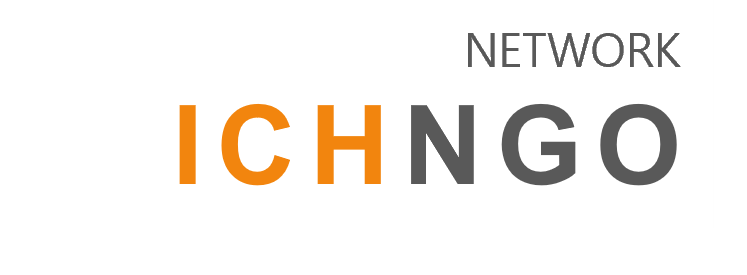
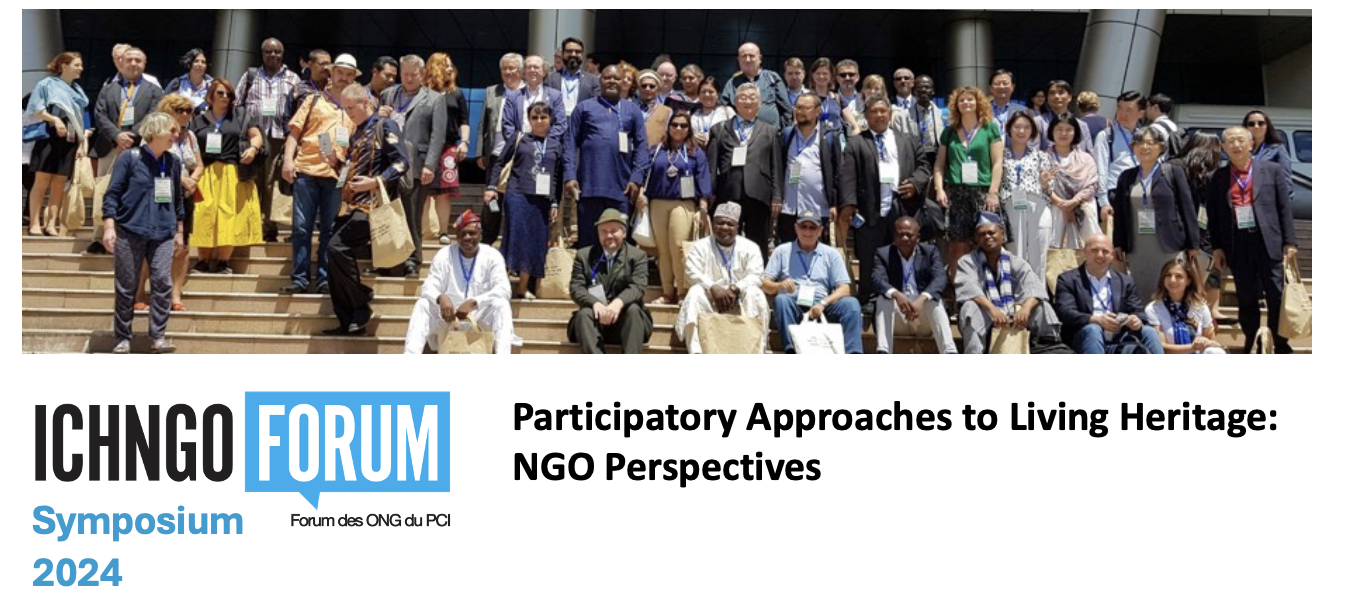
-2.jpg)
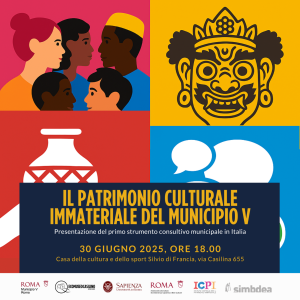
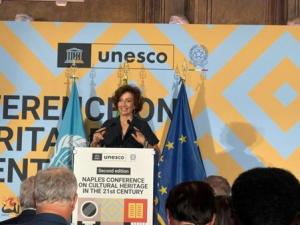
.png)
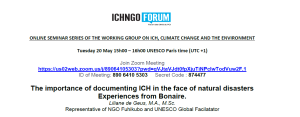

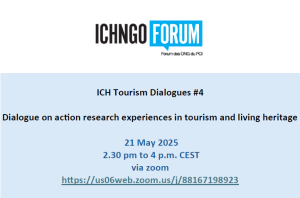
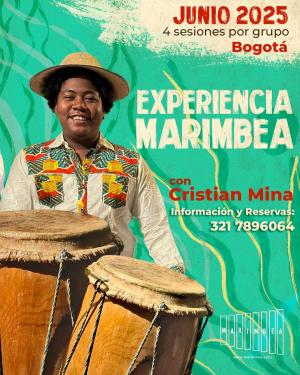
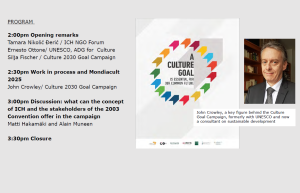
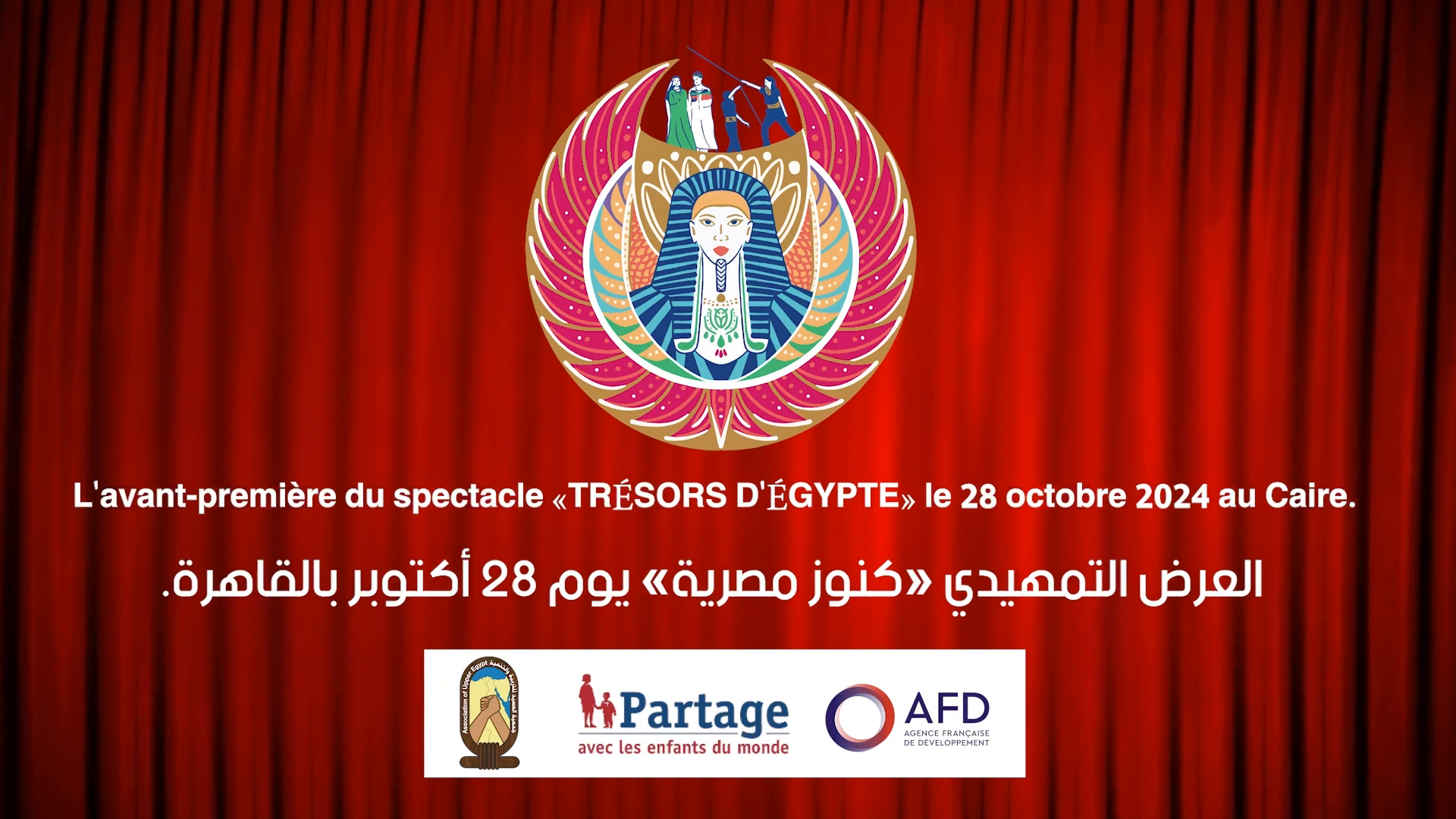
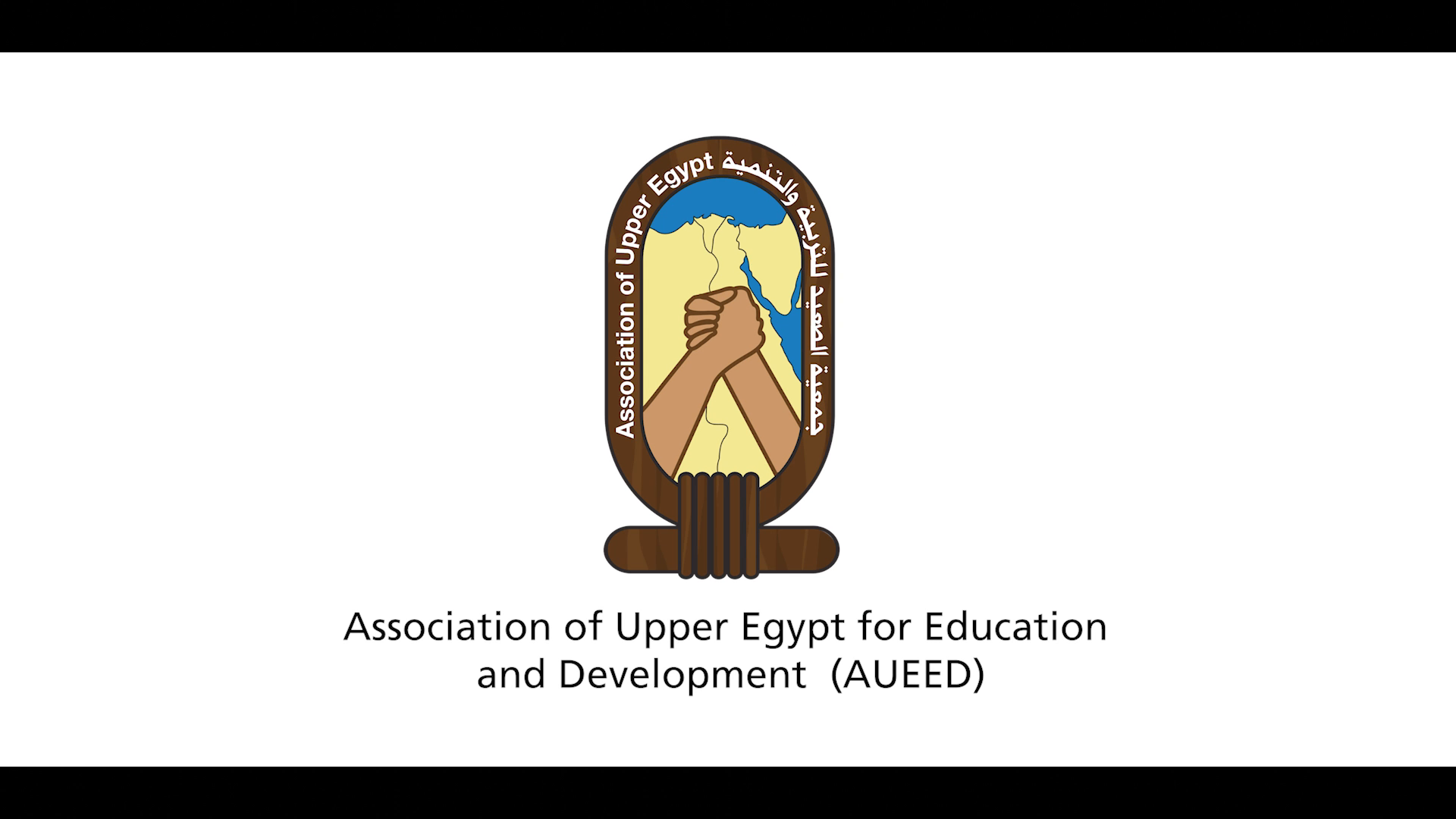
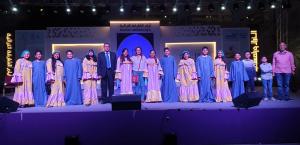
















 (40 x 60 cm).png)
.jpg)

.jpg)













.PNG)



(2021-12-17.png)







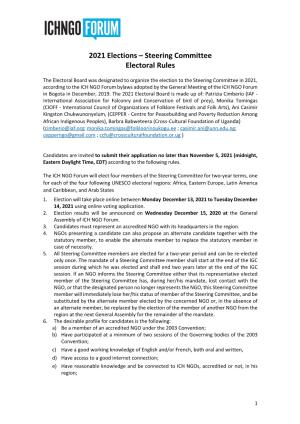



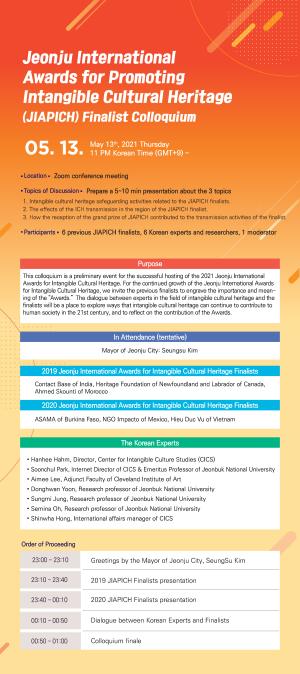





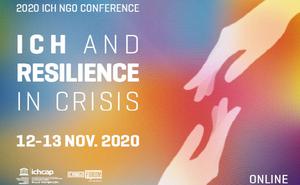


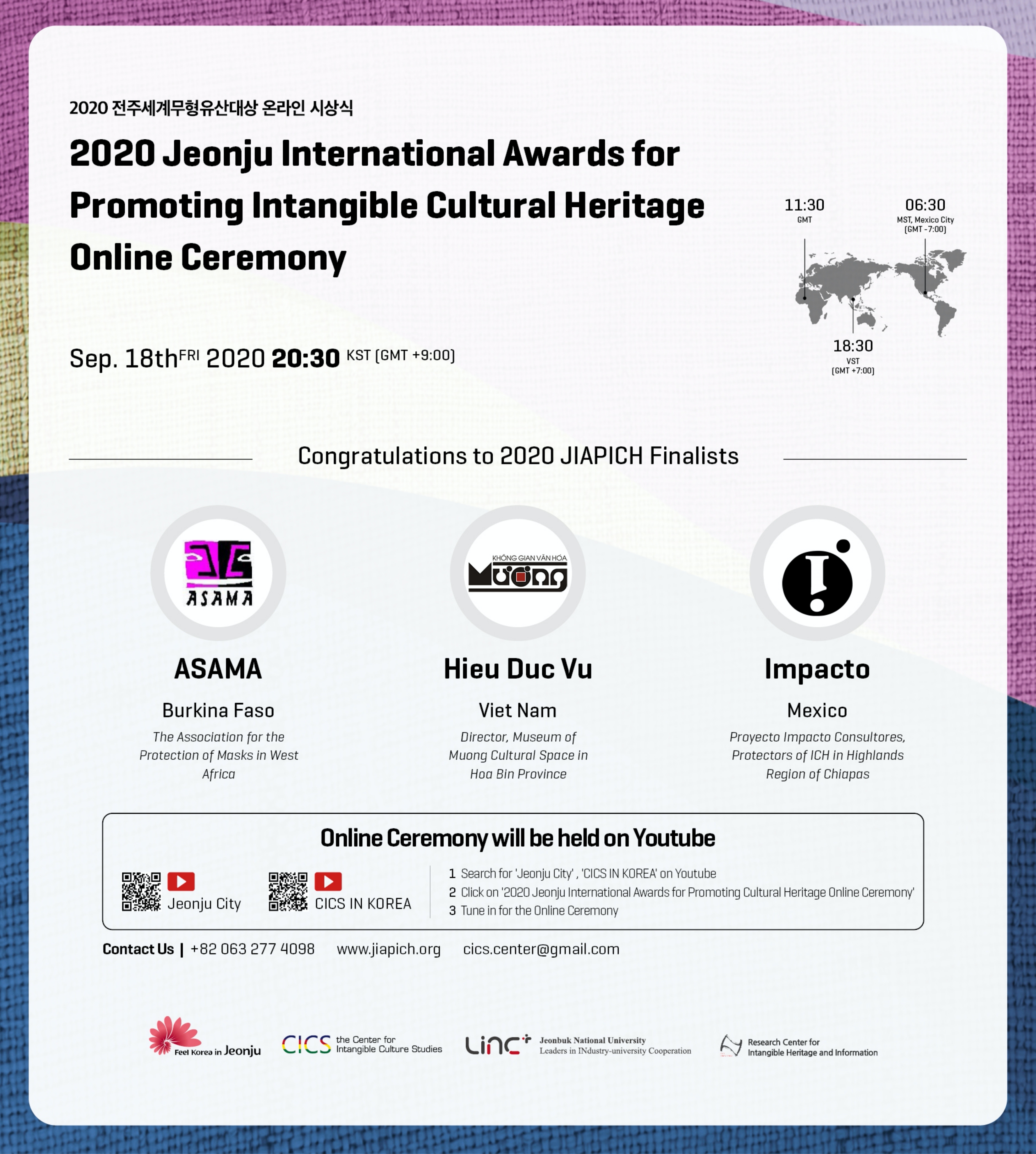



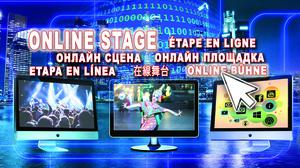






.jpeg)







.png)







.jpg)


















.jpg)




